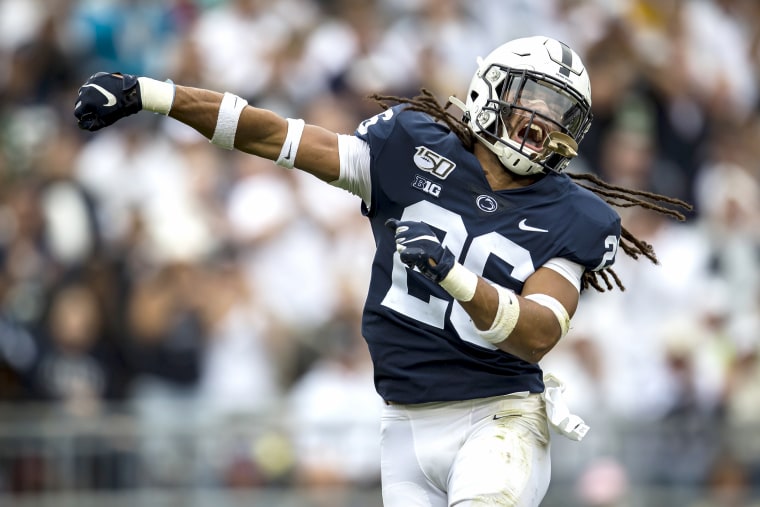Penn State’s football team is on a winning streak, but all one fan noticed recently was star safety Jonathan Sutherland's locs, describing them in an unsolicited, racist letter to the player as “awful hair," “disgusting” and “certainly not attractive.”
“Proud” older graduate Dave Petersen will, however, probably think twice before writing another such letter after being heavily criticized by Nittany Lion’s fans and the team's coach, James Franklin — let alone the rest of the internet. And Sutherland’s response to Petersen’s letter was pointed, and succinct, stating “although the letter was rude, ignorant and judging, I’ve taken no personal offense to it.”
Peterson somehow thought that telling Sutherland, the team captain, of his hope that the team would return to the “clean cut days” of Penn State football and critiquing Sutherland’s hair would be seen as a welcome intervention by the player. What it really was, despite Petersen’s protestations, was asinine — and the kind of statement that wearers of natural hair regularly experience from white people who do not realize that comments about black hair reveal their internalized racial biases.
To put a fine point on it, it’s not Petersen’s business about what any Penn State player does with their hair because it does not belong to him.
The policing of Black hair and black bodies, however, is nothing new. From the referee who cut a student’s locs off last year as a requirement to participate in a wrestling tournament, to the third grader denied a school picture because she had red extensions in her hair, natural hairstyles were and remain sites for white society to police and control what is deemed “unacceptable” grooming and presentation by Black people. While the pushback is a new phenomenon, the criticism is steeped in American history: Locs and other natural hairstyles were considered to be dirty, unkempt and unfashionable by some, while less kinky or even straight hair on African Americans was prized as “good hair,” even when it was nearly impossible to obtain.
With the advent of hot combs and relaxers in the 20th century, anyone with money could attain “good hair” for a price both monetary and physical — the latter from the pain of the lye products designed to change the structure of coarse hair. For many, this was an aesthetic choice: The fact remains that, in the American context which positions whiteness as the standard of beauty, flowing straight hair for women and short, straight hair for men is the racial norm. (Besides, who can forget that, in 1973's “The Way We Were,” Barbra Streisand’s Jewish character Katie Morosky had to get her curly hair straightened at a Harlem Salon to attract her WASP love interest Hubble?)
Employers past and present have also routinely enforced hairstyle codes based on court interpretations of Title VII of the 1964 Civil Rights Act, allowing Black people to wear their hair loose because of a 1976 decision. A different decision in the 1980s then allowed employers to prohibit Afrocentric hairstyles like locs and braids, declaring the styles were not "immutable" racial characteristics. That is changing rapidly. Numerous lawsuits in the last few years regarding natural hairstyles have resulted in changes, from changes in the United States military to laws in both New York and California banning discrimination against natural hair and Afrocentric styles.
But it is telling that it is a 1966 Penn State grad who remains stuck in the past regarding Black hair and its history in America. From the mid-1960s forward, Afros became a prominent statement not only of black pride, but of Black power. Cornrows, braids styles and locs became increasingly prevalent from the civil rights movement forward, and these hairstyles — worn throughout history by people of African descent — became one significant way for African Americans to reconnect with Black people in the diaspora.
No wonder then, that black people’s hair is perceived to be political and divisive: It is.
While changes to the acceptability of Black hairstyles in the workplace are welcomed, the furor surrounding Sutherland’s locs is one that unfortunately will continue as long as styles like locs and braids are considered to be unkempt or unprofessional, despite how much money and time are invested by wearers to maintain their hairstyles.
Petersen claimed that he was not making “a racist or cultural statement,” but that he wanted the coaches — and Franklin, who is the first Black head football coach at the university, instead defended his player — to "get the guys cleaned up.” Petersen, despite his protestations, leans on a racialized trope of cleanliness to assert his claim that he sees Penn state as a “bunch of clean cut guys."
This type of racialized nostalgia, coated in the language of respectability and conformity, is still racism. The "cleanliness" of natural hairstyles worn by black people is not up for debate; proximity to whiteness is not actually a proximity to purity. Negative comments like Petersen's clearly show the differences between those who have an unconscious bias toward those of another race, and those who understand that hair is part of an individual’s personhood, style and presence (and that different kinds of hair require different kinds of care).
So take a tip from me: The next time you want to comment on, touch or critique a black person’s hairstyle, and you aren’t a barber or a hairstylist, don’t. There’s a lot of history in black hair, and comments from anyone not paying for its upkeep are uncalled for.
CORRECTION (Oct. 10, 2019, 9:55 a.m. ET): A previous version of this article misspelled the name of the star of 1973's "The Way We Were." She is Barbra Streisand, not Barbara Striesand.



